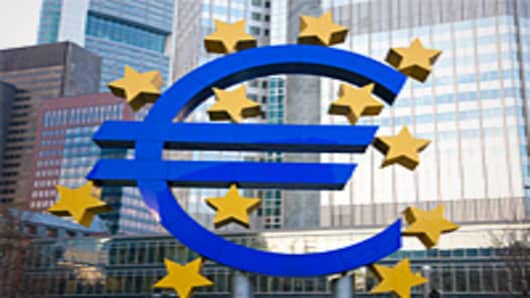European shares were set to open higher on Tuesday as investors came to the conclusion that the markets were most likely over-sold and news emerged overnight of around 100 billion euros ($127 billion) of liquidity provided by the European Central Bank to the Greek central bank to prop up Greece’s financial system.
The UK’s FTSE was called higher by 38 points at 5342, Germany’s DAX was seen opening 35 points up at 5366 and France’s CAC was called 22 points higher at 3049.
Overnight, the Financial Times revealed that Greece’s banking system was being propped up by the emergency liquidity, approved secretly by the ECB. The ECB’s weekly statement on banks’ use of emergency liquidity assistance (ELA) showed a spike at the end of last month.
Analysts at Barclays now believe Greece is now using 96 billion euros in ELA, with Ireland accounting for another 41 billion euros and Cyprus 4 billion euros.
If correct, the total ELA in use has exceeded 140 billion euros – more than 10 per cent of the amount lent to euro zone banks in standard monetary policy operations.Such an amount would require the approval of the ECB’s 23-member general council because of the risk of increasing inflation as a result of providing extra liquidity above 50 billion euros.
In Greece itself, the head of the county’s radical left party traveled to Paris on Mondayto try to consolidate support from political allies for rejecting the terms of the country's bailout package, ahead of general elections that could decide the destiny of Greece in the euro zone.
"I don't know if we have scared Europe, but judging by your presence here today, we have surprised it," Alexis Tsipras, the 37-year-old leader of Syriza, told journalists at the French National Assembly.
Meanwhile U.S. president Barack Obama urged Europe to strengthen its defenses against financial market turmoil as he brought a four day G8/NATO meeting of world leaders to a close in Chicago.
“I do sense greater urgency now than perhaps existed two years ago or two and a half years ago," Obama said.
He pointed to a four-pronged approach that would take in financial, economic, fiscal and monetary measures to address the euro zone crisis that, he said, was embraced by leaders who attended the two summits.
Whether that was true may become clearer on Wednesday when European leaders meet in Brussels to discuss policy responses to the continuing crisis.
But dividing lines between France and Germany over Eurobonds—debt backed by euro zone states collectively—appeared to deepen on Monday as newly appointed French finance minister Pierre Moscovici told a news conference that jointly issued euro zone bonds were a "strong idea" that should be discussed by leaders when they meet on Wednesday.
Moscovici’s comments followed his first meeting with his German counterpart, Wolfgang Schaeuble, in Berlin.
"We spoke about this, with both confirming a position that is already known," he told reporters.
"We will talk about this on Wednesday, and each side will put forward its opinions. But for us it's a strong idea," he added.
"The summit on Wednesday only makes sense if everything is on the table." Underscoring the ever present fear of contagion however, Spain's prime minister Mariano Rajoy said that guaranteeing financial stability in Europe was more important than the debate on Eurobonds, which would take time to define and implement.
"I believe that right now, it's much more urgent to resolve the problems of financial stability ...the Eurobonds, assuming they're approved, need a debate, need time," Rajoy said following the NATO summit in Chicago.
The Spanish premier’s concerns were understandable given that Spanish bank loan losses were estimated to have hit 260 billion euros by the International Institute of Finance (IIF) earlier on Monday.
It added that Spanish banks would likely need around 60 billion euros in outside help to stay afloat.
Away from the euro zone crisis, China can now reportedly bypass Wall Street when buying U.S. government debt and go straight to the U.S. Treasury, in what is the Treasury's first-ever direct relationship with a foreign government, according to documents viewed by Reuters.
The relationship means the People's Bank of China buys U.S. debt using a different method than any other central bank in the world.
Other central banks, including the Bank of Japan, which has a large appetite for Treasurys, place orders for U.S. debt with major Wall Street banks designated by the government as primary dealers.
Those dealers then bid on their behalf at Treasury auctions.
China, which holds $1.17 trillion in U.S. Treasurys, still buys some Treasurys through primary dealers, but since June 2011, that route hasn't been necessary.
Meanwhile, Facebookshares fell 11 percent on Monday, the company's second day as a publicly traded company, due to what many analysts and investors blamed on overly aggressive pricing by Facebook's underwriters, as well as a decision to expand the size of the offering by 25 percent.
JPMorganChase also saw its stocks fall 3 percent on Monday in a continuation of the fallout from a $2 billion trading loss announced at the start of the May. Chief Executive Officer Jamie Dimon told an investor conference on Monday that the company would a $15 billion share repurchase plan that Federal Reserve regulators had only just approved in March after running stress tests on the bank's capital.
In Asia, markets held on to gains on Tuesday after reclaiming some ground to move off lows for the year the day before, as hopes grew that Europe would embark on fresh action to address its debt crisis while promoting growth.
Global stocks rebounded on Monday, and riskier assets such as oil also rose, partly on expectations that China will undertake further stimulus measures as it makes maintaining expansion a priority.


